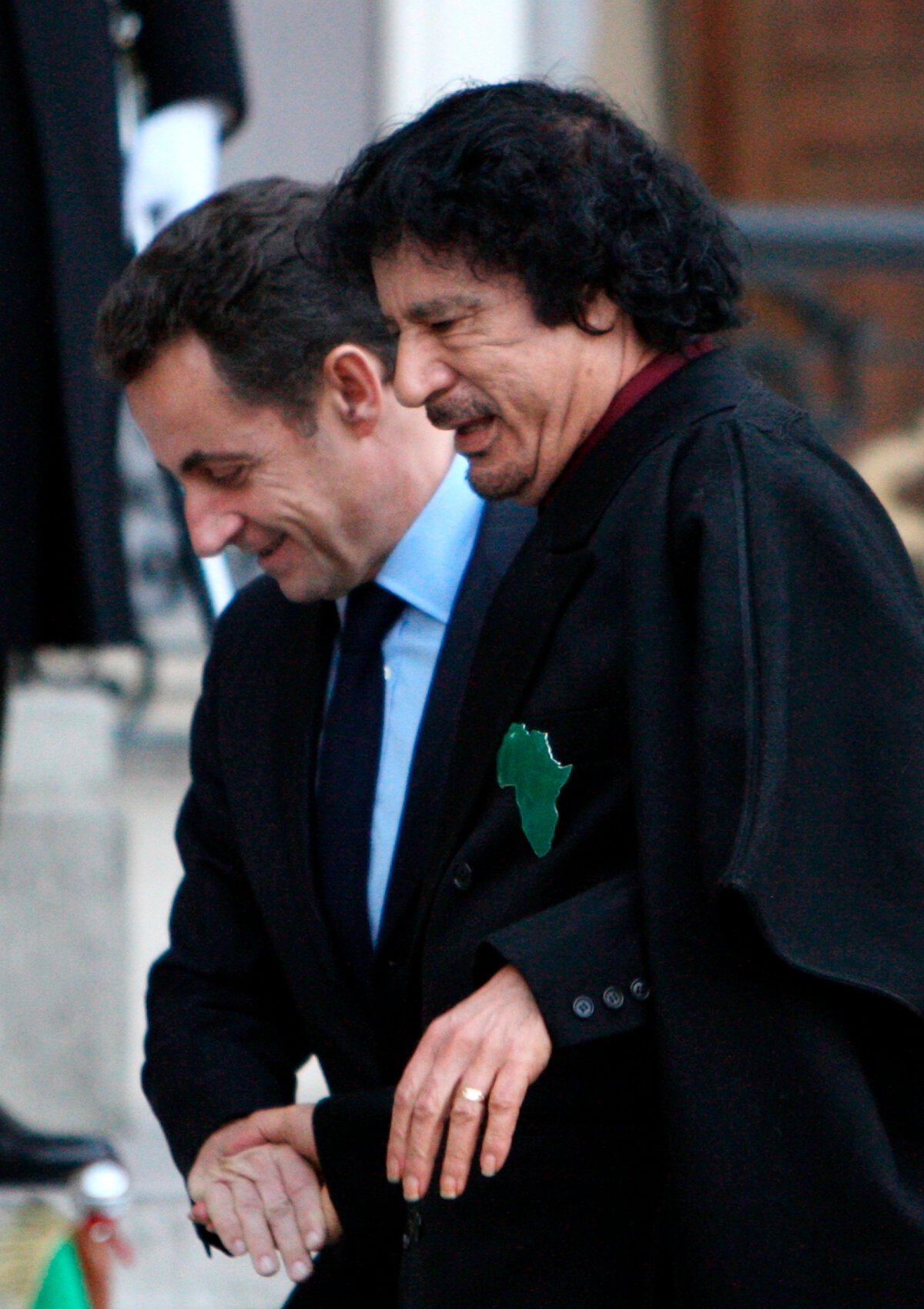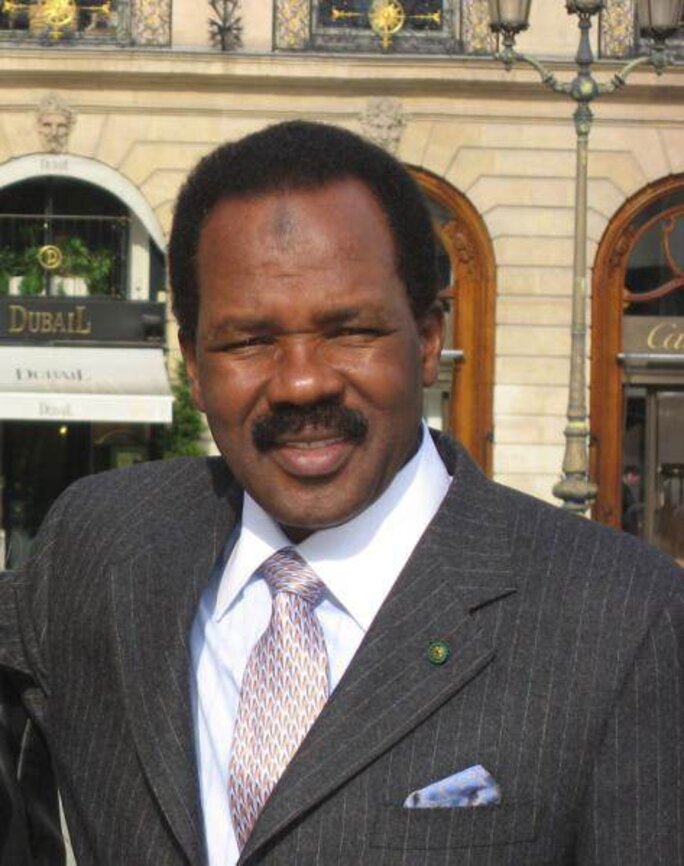A transcription of a conversation between the late Libyan dictator Muammar Gaddafi and Nicolas Sarkozy, the first held by the two men following Sarkozy’s election as president in May 2007, reveals that, contrary to recent denials by the outgoing French head of state, Tripoli was offered France's cooperation to develop a nuclear power programme, along with sales of weapons and security systems.
The document, exclusively revealed here by Mediapart, also contains an exchange between the two leaders to decide with which Libyan official Sarkozy could discuss what he described as “delicate questions”. Gaddafi confirmed Sarkozy’s suggestion that this should be Bashir Saleh, the dictator’s chief-of-staff and head of the Libyan African Portfolio (LAP) sovereign wealth investment fund, who is named in a separate document previously published by Mediapart (see here) as the paymaster for the secret Libyan funding of Sarkozy’s 2007 election campaign.
Sarkozy will step down from office on May 15th after losing his bid for a second term in this year's presidential elections, which were won by Socialist Party candidate François Hollande.
The Libyan transcript, which has been authenticated by French diplomatic sources, is a word-for-word account written in Arabic (see copy in Scribd box further below) of the conversation between Gaddafi and Sarkozy on May 28th 2007, less than two weeks after Sarkozy’s inauguration as president on May 16th 2007.

Enlargement : Illustration 1

Copies of the document, entitled ‘The telephone conversation that was held between the brother Leader of the Revolution and the elected French President Sarkozy’, were passed to the Libyan foreign affairs ministry, the Libyan security services, and to the man in charge of the Libyan army’s weapons purchases, General Abderrahmane El Sid.
The document bears the dates May 27th and May 28th 2007. Both France’s then-foreign minister, Bernard Kouchner, and Sarkozy’s then-chief-of-staff, Claud Guéant, have previously officially confirmed that, following his election, Sarkozy’s first conversation with Gaddafi was on May 28th. Similarly, the date is also noted in official French foreign ministry records as May 28th 2007.
In France, conversations between the president and foreign heads of state are always held in the presence of a diplomatic advisor for the French presidency, or one of his staff, according to a French foreign affairs ministry source contacted by Mediapart. The source, who asked not to be named, said the conversation would be followed by those present on the French side via amplifier speakers. “But in principle this kind of conversation is not recorded,” said the source. “The diplomatic advisor can write-up a summary, kept at the Elysée [presidential office], [and] transmitted or not by telegram to the foreign affairs ministry, the ministry, the ambassador and the services concerned.”
The Libyan transcript, published here in a literal translation with the original comma-punctuated flowing sentences, begins with Gaddafi’s expression of congratulations to the French president.
“I reiterate my congratulations for the confidence of the French people who elected you as president, and you deserve that confidence,” Gaddafi told Sarkozy.
“Mr. President, I am delighted to talk to you on the telephone,” Sarkozy replied, “and I have not forgotten the appointment you gave me [Editor’s note: in Tripoli in 2006], and I have magnificent memories of the quality of the analyses from you that I listened to, and indeed you deserve this title of Leader. I was very moved by the letter of congratulations that you sent to me.”
Soon into the conversation, Sarkozy made a series of commercial propositions. “I would like to give a new dimension to our bilateral relations, for example concerning nuclear energy, and if you accept, I am ready to send an exploratory mission to study the question," he told Gaddafi. “And in the defence field, I am happy if we could work concretely with Libya, and in the area of the fight against terrorism we could go yet further than what we have done so far.”
Importantly, during this year’s French presidential election campaign, Sarkozy, who unsuccessfully ran for a second term in office, vehemently denied reports that he had offered Libya French cooperation to build a nuclear plant. “There was never any question of selling a [nuclear] plant to Mr Gaddafi,” he said in an interview with French radio station France Inter on April 17th.
In another interview with RMC radio and BFM TV on April 18th, in which he was again questioned about the reports France had offered Gaddafi a civil nuclear cooperation deal, Sarkozy said: “The only project that ever existed for the Libyans was a sea water desalination plant, which they never wanted, which they never built and for which discussions never began.”
In the Libyan transcription of the May 28th phone conversation between Gaddafi and the French president, Sarkozy also raised the issue of five Bulgarian nurses and a Palestinian doctor imprisoned for life in Libya for allegedly conspiring to infect children with the HIV virus. Sarkozy had already begun working for a solution to free the six medical staff. His ultimately successful bid, in which the French president’s then-wife Cécilia, from whom he is now divorced, played a high-profile part, marked the Sarkozy administration's first major diplomatic coup. During their conversation, Sarkozy told Gaddafi: “I think that it is now time for this new phase. I am happy because the Libyan negotiator will visit Paris soon, and we are open to discussions on all the propositions of compensation for the victims, and finally, I would like to visit Libya, and I would be very pleased if you would yourself make a visit, and the best [thing] would be that this visit allows for the finding of a solution to the problem of the nurses and the doctor.”
The French president’s words clearly contradict both the official French explanation that Gaddafi’s visit to Paris in December 2007 was organized in return for the release from jail of the nurses and doctor, as they do also a statement by the French presidency’s senior diplomatic advisor, Jean-David Levitte, that Sarkozy would not travel to Libya before the freeing of the medical team. “What the French president did […] was to refuse to go to Libya as long as the nurses were not freed and back home,” Levitte told a French parliamentary commission. “The French president had said ‘no visit without [their] freeing’”.
The Libyan document shows that the question of the release of the Bulgarian nurses and Palestinian doctor, which was raised just once during the conversation, was not a pre-condition to the organizing of reciprocal visits by the Libyan and French leaders.
The Libyan transcription also illsutrates Sarkozy’s keeness to meet with Bashir Saleh, Gaddafi’s administrative chief-of-staff and head of the 40-billion dollar Libyan African Portfolio (LAP) sovereign wealth investment fund. The LAP was used by the Gaddafi regime for secret funding missions.
In an exclusive report published April 28th, Mediapart revealed a document prepared in December 2006 and signed by Gaddafi’s foreign intelligence agency chief, Moussa Koussa, which detailed the former regime’s approval of a payment of 50 million euros for Sarkozy’s 2007 presidential election campaign. Saleh was to be tasked with supervising the payment.
Following that report, Sarkozy filed an official complaint against Mediapart on April 30th with the Paris public prosecutor’s office, citing “forgery and use of forgery”, “handling and receiving [forgeries]” and “publication of false information”. Mediapart responded on May 2nd by lodging an official complaint against Sarkozy for calumny.
The French presidency was lent support in its attempts to discredit the document by both Bashir Saleh and Moussa Koussa. Saleh until earlier this month enjoyed residency in France under official protection despite figuring on an Interpol request for his arrest on behalf of Libya, where he is wanted on fraud charges. He is now believed to have fled to Senegal. Koussa is also wanted by Libya and currently lives in protected exile in Qatar.
“I would like to tell you that I would be happy to meet Mr Bashir, and I think you have thus understood, Mr. Leader, that I have the desire to work with you and Libya,” Sarkozy told Gaddaffi during the May 28th 2007 conversation.
“In all, I am delighted with this contact,” Gaddafi told Sarkozy, “and we are reassured to have, in you, a friend in Europe, I have followed your declarations, and basing myself on the meeting we had in the past, I know that you have a determination and a will, and I am very optimistic, we will do many things between the two countries [sic] and between Europe and Africa, and in the Mediterranean Sea, and I agree on all your propositions, and we have no reservations concerning nuclear energy for pacific ends, and defence and the fight against terrorism, and I will also be pleased to meet you in France, and I take delight in the meeting here or there, and I thank you for this invitation addressed to the general secretary of the Sahel Sahara group, and Bashir also is at your disposition at any moment.”
Towards the end of the conversation, Sarkozy returns to the question of the necessity for a direct contact with Bashir Saleh.

“Who is the person who I could meet to discuss with them delicate questions?” Sarkozy asked Gaddafi. “Is it Mr Bashir or the minister who comes on your behalf?” The Libyan dictator replied: “It could be Bashir because he speaks French and you can talk together directly.”
Sarkozy then said: “Understood Mr. Leader, so I will meet with Mr Bashir and work things out with him and perhaps at that moment a visit that you will make to France or that I will make to Libya.” To which Gaddafi answered, “If god wishes, if god wishes.”
The conversation ended with a polite exchange that contrasts, with no little irony, with what would eventually be a bloody end to the relationship with Gaddafi, who was toppled and killed following the French-initiated NATO intervention against his regime last year. The Libyan transcript records the concusion of the conversation as follows:
Sarkozy: “I count on your prayers, Mr Leader.”
Gaddafi: “Thank you.”
Sarkozy: “I have not prayed in the same manner, but we pray for the same god.”
Gaddafi: “Thank you so much.”
Sarkozy: “I wish to express to you my respects and my friendship, Mr Leader.”
Gaddafi: “And the same for me, thank you so much.”
Sarkozy: “Good-bye.”
Neither the head of the French presidency’s communications department, Frank Louvrier, nor President Sarkozy’s diplomatic advisors, Jean-David Levitte and Boris Boillon, returned Mediapart’s calls inviting them to comment on the transcript.
-------------------------
For more about the issues raised in this article, click on the links to Mediapart's investigations below:
Former Libyan PM confirms Gaddafi gave Sarkozy 50M euros for election campaign
French government stalls Interpol call for arrest of Gaddafi funding chief
Sarkozy attacks Mediapart over Gaddafi funding revelations
Gaddafi funding of Sarkozy election campaign: the proof
Exclusive: secret report describes Gaddafi funding of Sarkozy's 2007 election campaig
French IT group Bull horned by Libyan internet espionage deal
French judge finds key evidence in illegal funding probe
Net closes in on French presidency after funding 'scam' arrests
Arms dealer probe brings illegal funding scandal closer to Sarkozy
The secret financier who brings danger to the Sarkozy clan
Sarkozy, the arms dealer, and a secret 350 million-euro commission
Exclusive: how Sarkozy's team sought grace for Gaddafi's murderous henchman
Exlusive: how President Sarkozy's team dealt with Gaddafi
When Total paid the bill for the Elysée's secret emissary
The French-built stealth offroader that may be hiding Gaddafi
-------------------------
English version: Graham Tearse


